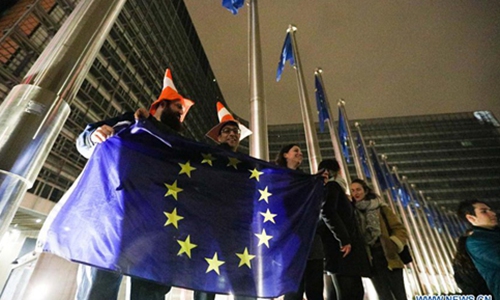Brexit not done yet, power structures still need to be worked out
By He Zhigao Source:Global Times Published: 2020/2/2 18:48:40

People from the United Kingdom gather to mark the Brexit in front of the European Commission headquarters in Brussels, Belgium, Feb. 1, 2020. Photo: Xinhua
After the UK officially terminated its 47-year membership in the European Union (EU) on Friday, it has entered an 11-month transition period, which keeps the UK bound to the EU's rules and regulations.
Over the next 11 months, trade relations between the two sides will maintain the status quo, but the UK will not participate in the EU's decision-making process. The two sides still have to negotiate future relations and there are different prospects. On January 1, 2021 when the UK formally leaves the EU, both sides will still face many difficulties.
The economic impact of Brexit on EU member states mainly comes through three channels: trade, labor and capital. With the UK leaving the European single market and the Customs Union, the two sides must sign a new free trade agreement to ensure the free flow of goods. But if the two sides fail to reach an agreement, British exports to the EU will face tariffs and other barriers. The flow of trade and personnel is an important issue in their negotiation. If the UK pursues a free trade agreement and the EU insists on a single market, it will be difficult for them to reach a compromise. Thus, the UK may give up freer trade to achieve discretionary labor measures, which will lead to additional financial market barriers.
Given the complexity of the UK-EU negotiations, Brexit will be much more difficult than expected. In addition to economic and trade issues, the UK and the EU also need to negotiate many other important issues such as data sharing, civil aviation standards, fisheries, power and natural gas supplies and education exchanges. Since the UK is the second-largest contributor in the EU budget, the EU's multiannual financial framework for the 2021-27 period, which involves the EU's development priority, will become the main topic within the EU.
From a political and strategic perspective, the international landscape is facing the dual effects of globalization and geopolitics. The intensification of great power politics has highlighted the prominent position of strategic autonomy, and Brexit has become an important part of this changing world pattern. After Brexit, the UK will face many issues within the UK and the international environment. Brexit reshapes relations within the UK and restructures relations between the EU and the UK. Brexit also affects the future development of European integration and the EU's relations with other major powers.
Brexit is a double-edged sword. It is a lesson in the process of EU integration. The EU mechanism reform and multi-speed integration - an initiative that allows different parts of the EU to integrate at different levels and pace - may be the cure that would help the acceleration of EU integration.
In the short term, Brexit poses tremendous pressure and challenges to EU integration. The blueprint and relevant social policies of EU integration, led by the bloc's elites, failed to fully take ordinary people's interests and feelings into account, pushing protesters to the Eurosceptic camp, causing social divisions and even triggering political crisis. Brexit may also threaten other member states' confidence in the EU system and EU integration.
In the medium and long term, Brexit may help the EU's political elites reflect on the integration process. In addition, the EU will utilize Brexit negotiations as a disciplinary measure to prevent other countries from considering leaving the EU, because Brexit will inevitably cause significant economic and welfare losses for Britain.
At the same time, the Brexit process has forced the EU to reexamine its own institutional structure and its distribution of power and responsibilities between EU institutions and member governments. The balance of power within the EU and the bloc's policy outlook are bound to change. Brexit also provides opportunities for the EU's next institutional reform and a reference event for the future direction of EU integration.
After Brexit, the EU will have to reconsider its role on the global stage. The most important thing is the relationship between the EU and other major powers, that is, how to regain the EU's strategic autonomy in the era of great power competition. Without the trade leverage generated by a larger market like the EU, the UK will be eager to quickly reach a trade agreement with the US. At the same time, the US may continue to pile pressure on the EU on issues such as tariffs.
In the face of Brexit, the future of China-UK relations is not pessimistic. Since WWII, the UK's foreign policy has adhered to three circles - ties with the Commonwealth, Europe and the US. But after Brexit, a fourth circle will emerge - British relations with emerging markets, represented by China. That being said, the UK will attach more importance to a balancing and pragmatic foreign policy, so as to maximize its interests.
China-EU relations will face both opportunities and challenges. In the context of Brexit, China's response to the restructuring of the EU is a new task, as it ensures there is room in China-EU cooperation to properly handling disagreements.
The author is a research fellow with the Institute of European Studies, Chinese Academy of Social Sciences. opinion@globaltimes.com.cn
Posted in: VIEWPOINT,CHINA-EUROPE